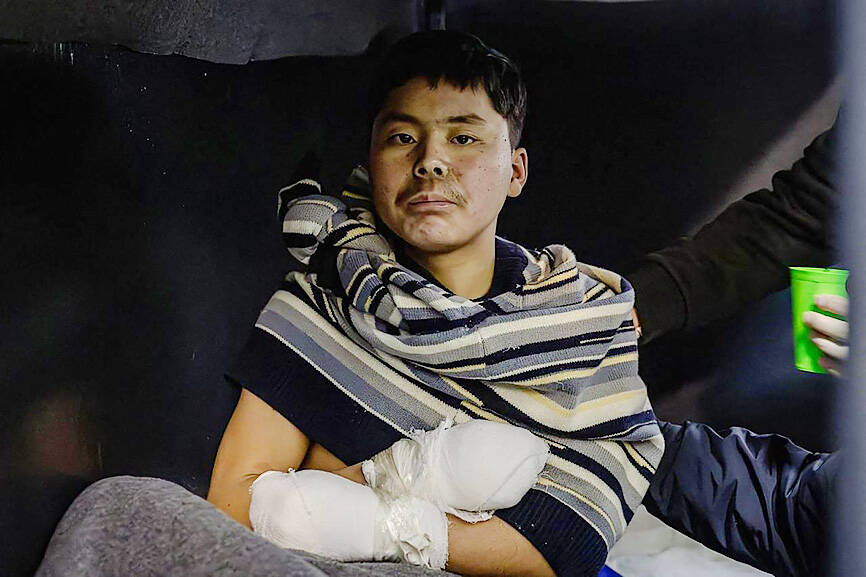A South Korean lawmaker yesterday said that a North Korean soldier captured by Ukraine wanted to live a “normal life” in the South, after Seoul vowed to offer citizenship to Pyongyang’s troops.
In January, the South Korean National Intelligence Service confirmed that the Ukrainian military had captured two of the estimated 10,000 North Korean soldiers sent by North Korean leader Kim Jong-un to fight for Moscow in their war against Kyiv.
South Korean Representative Yu Yong-weon said that he met the two soldiers, who remain in Ukrainian custody at a detention facility in an undisclosed location, after submitting a request to Kyiv.

Photo: AFP / Telegram / V_Zelenskiy_official
“The moment I faced the two young prisoners, I was overwhelmed with emotions — compassion, sympathy and an innate sense of empathy,” Yu told a news conference.
One of the soldiers told him he wanted to move to South Korea so that he could eventually reunite with his parents, he said.
Yu also said that the soldier asked if he would be able to “live as he wish with the rights I hope for” if he goes to South Korea and asked if he would be able to “have a home and start a family there.”
Under South Korea’s constitution, all Koreans, including those who live in the North, are considered citizens, and officials last month reaffirmed that would apply to any troops captured in Ukraine.
Sending the soldiers back to the North would be “essentially a death sentence,” Yu said.
North Korean troops have been instructed to kill themselves rather than be captured, South Korean intelligence has said, and Yu said the soldiers told him they had witnessed multiple suicides by grenade by injured comrades.
“Even as prisoners of war, North Korean soldiers are constitutionally recognized as South Korean citizens and must be protected accordingly,” Yu said.

Philippine President Ferdinand Marcos Jr has fired his national police chief, who gained attention for leading the separate arrests of former Philippine president Rodrigo Duterte on orders of the International Criminal Court and televangelist Apollo Carreon Quiboloy, who is on the FBI’s most-wanted list for alleged child sex trafficking. Philippine Executive Secretary Lucas Bersamin did not cite a reason for the removal of General Nicolas Torre as head of the 232,000-member national police force, a position he was appointed to by Marcos in May and which he would have held until 2027. He was replaced by another senior police general, Jose

STILL AFLOAT: Satellite images show that a Chinese ship damaged in a collision earlier this month was under repair on Hainan, but Beijing has not commented on the incident Australia, Canada and the Philippines on Wednesday deployed three warships and aircraft for drills against simulated aerial threats off a disputed South China Sea shoal where Chinese forces have used risky maneuvers to try to drive away Manila’s aircraft and ships. The Philippine military said the naval drills east of Scarborough Shoal (Huangyan Island, 黃岩島) were concluded safely, and it did not mention any encounter with China’s coast guard, navy or suspected militia ships, which have been closely guarding the uninhabited fishing atoll off northwestern Philippines for years. Chinese officials did not immediately issue any comment on the naval drills, but they

POWER CONFLICT: The US president threatened to deploy National Guards in Baltimore. US media reports said he is also planning to station troops in Chicago US President Donald Trump on Sunday threatened to deploy National Guard troops to yet another Democratic stronghold, the Maryland city of Baltimore, as he seeks to expand his crackdown on crime and immigration. The Republican’s latest online rant about an “out of control, crime-ridden” city comes as Democratic state leaders — including Maryland Governor Wes Moore — line up to berate Trump on a high-profile political stage. Trump this month deployed the National Guard to the streets of Washington, in a widely criticized show of force the president said amounts to a federal takeover of US capital policing. The Guard began carrying

Ukrainian drone attacks overnight on several Russian power and energy facilities forced capacity reduction at the Kursk Nuclear Power Plant and set a fuel export terminal in Ust-Luga on fire, Russian officials said yesterday. A drone attack on the Kursk nuclear plant, not far from the border with Ukraine, damaged an auxiliary transformer and led to 50 percent reduction in the operating capacity at unit three of the plant, the plant’s press service said. There were no injuries and a fire sparked by the attack was promptly extinguished, the plant said. Radiation levels at the site and in the surrounding